The Olympic Games 1896 Athens
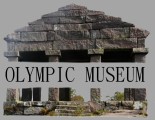

While the Hellenic Committee thus labored over the scenic requirements, the international committee and the national committees were occupied in recruiting competitors. The matter was not as easy as one might think. Not only had indifference and distrust to be overcome, but the revival of the Olympic games had aroused a certain hostility. Although the Paris Congress had been careful to decree that every form of physical exercise practiced in the world should have its place on the program, the gymnasts took offense. They considered that they had not been given sufficient prominence. The greater part of the gymnastic associations of Germany, France, and Belgium are animated by a rigorously exclusive spirit; they are not inclined to tolerate the presence of those forms of athletics which they themselves do not practice; what they disdainfully designate as « English sports» have become, because of their popularity, especially odious to them. These associations were not satisfied with declining the invitation sent them to repair to Athens. The Belgian federation wrote to the other federations, suggesting a concerted stand against the work of the Paris Congress. These incidents confirmed the opinions of the pessimists who had been foretelling the failure of the fetes, or their probable postponement. Athens is far away, the journey is expensive, and the Easter vacations are short. The contestants were not willing to undertake the voyage unless they could be sure that the occasion would be worth the effort. The different associations were not willing to send representatives unless they could be informed of the amount of interest which the contests would create. An unfortunate occurrence took place almost at the last moment. The German press, commenting on an article which had appeared in a Paris newspaper, declared that it was an exclusively Franco-Greek affair; that attempts were being made to shut out other nations; and furthermore, that the German associations had been intentionally kept aloof from the Paris Congress of 1894. The assertion was acknowledged to be incorrect, and was powerless to check the efforts of the German committee under Dr. Gebhardt. M. Kemeny in Hungary, Major Balck in Sweden, General de Boutonski in Russia, Professor W. M. Sloane in the United States, Lord Ampthill in England, Dr. Jiri Guth in Bohemia, were, meantime, doing their best to awaken interest in the event, and to reassure the doubting. They did not always succeed. Many people took a sarcastic view, and the newspapers indulged in much pleasantry on the subject of the Olympic games.
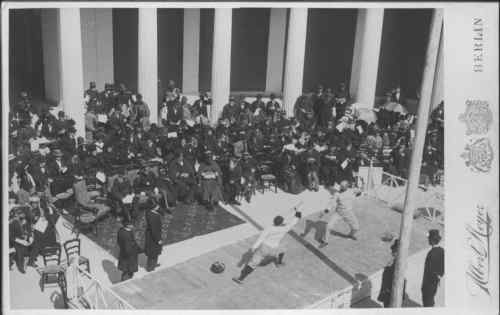
Fencing.
The final contest in the fencing match with swords took places in
the morning in presence of the King, the Crownprince and Prince George
3 Greeks and 2 foreign competitors took part in it. Messrs Karakalos, Georgiadhis,
Iatridhis, Nielsen (Dane) Schmall (Austrian). There were 10 contests.
First pair : Karakalos against Schmall. Victor: Karakalos having
not been touched at all.
Second pair : Georgiadhis against Iatridhis : Victor : Georgiadhis,
having not been touched at all.
Third pair: Nielsen against Karakalos. Victor : Karakalos, having
been touched twice.
Fourth pair : Schmall against Georgiadhis. Victor : Georgiadhis,
having been touched twice.
Fifth pair : Iatridhis against Nielsen. Victor : Nielsen, having
been touched once.
Sixth pair : Karakalos against Georgiadhis. Victor : Georgiadhis,
having been touched twice.
Seventh pair: Schmall against Iatridhis.Victor: Schmal, having been
touched twice.
Eighth pair : Nielsen against Georgiadhis. Victor : Georgiadhis,
having been touched twice.
Ninth pair: Karakalos against Iatridhis. Victor: Karakalos not having
been touched at all.
Tenth pair : Schmall against Nielsen. Victor : Nielsen having been
touched twice.
Mr Georgiades of Tripolis, a young student, won the first prize,
His Majesty and their Royal Highnesses did not fail to congratulate him
most heartily on his success. Sub. Lieutenant Karakalos R. A. won the second
prize.
Source document: Official Report 1896
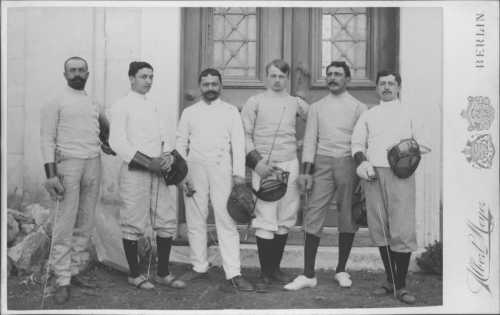
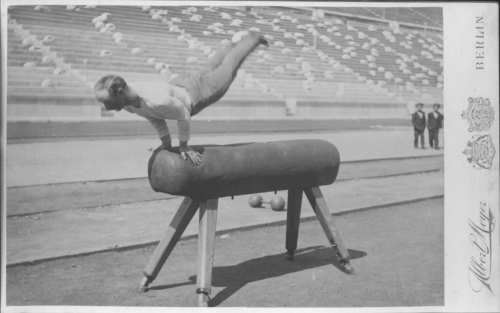
Easter Monday, April 6, the streets of Athens wore a look of extraordinary
animation. All the public buildings were draped in bunting; multicolored
streamers floated in the wind; green wreaths decked the house fronts. Everywhere
were the two letters «0. A.,» the Greek initials of the Olympic
games, and the two dates, B. C. 776, A. D. 1896, indicating their ancient
past and their present renascence. At two o'clock in the afternoon the
crowd began to throng the Stadion and to take possession of the seats.
It was a joyous and motley concourse. The skirts and braided jackets of
the palikars contrasted with the somber and ugly European habiliments.
The women used large paper fans to shield them from the sun, parasols,
which would have obstructed the view, being prohibited. The king and the
queen drove up a little before three o'clock, followed by Princess Marie,
their daughter, and her fiancé, Grand George of Russia. They
were received by the crown prince and his brothers, by M. Delyannis, president
of the Council of Ministers, and by the members of the Hellenic Committee
and the international committee. Flowers were presented to the queen and
princess, and the cortege made its way into the hemicycle to the
strains of the Greek national hymn and the cheers of
the crowd. Within, the court ladies and functionaries, the diplomatic
corps, and the deputies awaited the sovereigns, for whom two
marble arm-chairs were in readiness. The crown prince, taking his stand
in the arena, facing the king, then made ashort speech, in which he touched
upon the origin of the enterprise, and the obstacles sur mounted in bringing
it to fruition. Addressing the king, he asked him to proclaim the opening
of the Olympic games, and the king, rising, declared them opened. It was
a thrilling moment. Fifteen hundred and two years before, the Emperor Theodosius
had suppressed the Olympic games, thinking, no
doubt, that in abolishing this hated survival of paganism he was furthering
the cause of progress; and here was a Christian monarch, amid the applause
of an assemblage composed almost exclusively of Christians, announcing
the formal annulment of the imperial decree; while a few feet away stood
the archbishop of Athens, and Pere Didon, the celebrated Dominican preacher,
who, in his Easter sermon in the Catholic cathedral the day before, had
paid an eloquent tribute to pagan Greece. When the king had resumed his
seat, the Olympic ode, written for the occasion by the Greek composer Samara,
was sung by a chorus of one hundred and fifty voices. Once before music
had been associated with the revival of the Olympic games.
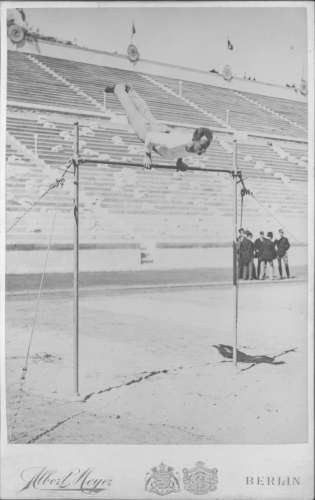
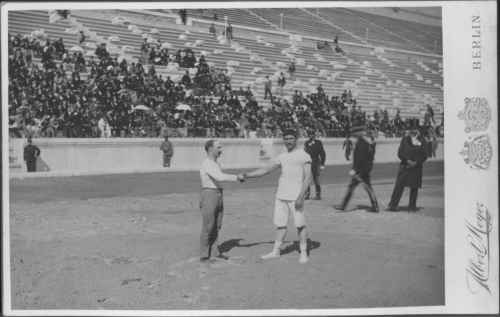
The programme of that day was again made up by games of various attractions.
In the morning the wrestling match was continued; although the entrance
to the Stadion was free, few people comparatively assembled there. The
Marathon race being over, the games had lost much of their attractions.
Mr Schumann and Mr Tsitas continued to wrestle for some time, both giving
proof of great skill and strength; victory smiled on Mr Schumann, who clutching
his antagonist round the hips threw him on the ground. The audience demanded
then that Mr Christopoulos should wrestle with M. Schumann; unfortunately
this was impossible for the valiant Hellene had receiv - ed such severe
bruises the day before, that he was unable to move from his couch. Thus
Mr Schumann was proclaimed victor in the wrestling match and the German
flag was hoisted in honour of his nationality.
Source document: Official Report 1896
The first session of the Paris Congress had been held June 16,1894, in the great amphitheater of the Sorbonne, decorated by Puvis de Chavannes; and after the address of the president of the congress, Baron de Coubertin, the large audience had listened to that fragment of the music of antiquity, the hymn to Apollo, discovered in the ruins of Delphi. But this time the connection between art and athletics was more direct. The games began with the sounding of the last chords of the Olympic ode. That first day established the success of the games beyond a doubt. The ensuing days confirmed the fact in spite of the bad weather. The royal family was assiduous in its attendance. In the shooting-contest the queen fired the first shot with a flower wreathed rifle. The fencing matches were held in the marble rotunda of the Exposition Palace, given by the Messrs. Zappas, and known as the Zappeion. Then the crowd made its way back to the Stadion for the foot races, weight-putting, discus-throwing, high and long jumps, pole-vaulting, and gymnastic exhibitions. A Princeton student, Robert Garrett, scored highest in throwing the discus. His victory was unexpected. He had asked me the day before if I did not think that it would be ridiculous should he enter for an event for which he had trained so little! The stars and stripes seemed destined to carry off all the laurels.
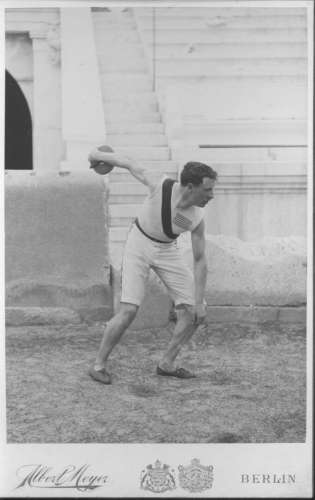
The most interesting of the sports on this first day of the Games
was decidedly the discus throwing. The day was already in its decline and
the coolness of an evening in March was perceptibly felt, but still the
contest excited a general interest for 2 Greeks, Mr Versis and Mr Paraskevopoulos
were known to be excellent discus throwers. The number of the competitors
was 11; amongst them were ; one Frenchman, one Swede one American, one
Englishman, 3 Danes, one German, 3 Greeks, the two young gentlemen, mentioned
above, and Mr Papasideris. This contest more than any other had assumed
an international character, on account of the various nationalities of
the competitors. Standing with a coat or a mantle gracefully thrown over
their shoulders, for the atmosphere had become very cool, each one in turn
threw his discus. By the awkward way in which some of the foreign competitors
threw the discus, it was easily perceived that most of them had not been
accustomed to this sort of sport; but the graceful movements, and the skill
of the Greek discus throwers were admired by all beholders, strangers as
well as Athenians. Mr Versis in particular showed a harmony and a dignity
in his attitudes which would not have disgraced an Ancient discus thrower.
He himself is beautiful of form like an ancient statue. Most of the competitors
had soon to abandon the contest only Mr Versis and Mr Paraskevopoulos and
Mr Garret, an American, continued the spirited contest. Alas, Mr Versis,
was not able to continue after a while and the contest became a duel between
Mr Garret and Mr Paraskevopoulos.
The Greek Champion throw for, the last time his discus to a distance
of 28 mtrs 95 1/2 cent. Loud acclamations resounded from all sides, for
nobody could believe it possible that such a marvellous throw could be
surpassed by anyone, M. Garret however contrived to throw his discus to
a distance of 29 mtrs 15 ; he was therefore declared victorious, his throw
having surpassed that of his adversary by 19 1/2 centimètres. Most
of the spectators were rather disappointed by this result, but nevertheless
when for the second time, the stars and stripes were seen waving in the
air loud cheers greeted the victor.
Source document: Official Report 1896
When they ran up the «vietor's mast,» the sailors of the San Francisco, who stood in a group at the top of the Stadion, waved their caps, and the members of the Boston Athletic Association below broke out frantically, «B. A. A.! rah! rah! rah!» These cries greatly amused the Greeks. They applauded the triumph of the Americans, between whom and themselves there is a warm feeling of good-will.